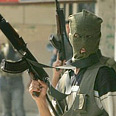
Hamas: Poses new threats
צילום: רויטרס
Winograd prompts Gaza paralysis
Israeli failure to act in face of rocket fire directly related to Lebanon war report
Don't let them tell you there is no connection between the Winograd report and the Israeli conduct in Gaza.
For four days the Israeli government was paralyzed in the face of the Qassam rocket barrages. Luckily we had unstable weather that they could blame for this show of helplessness. It took the government four days to realize that Hamas was continuing to fire rockets simply because no one was stopping them.
There is no reason to search for explanations and ideologies. The scorpion bites because it's a scorpion. Until Hamas starts paying the price – the attacks won't stop.
The political leadership decided it was unwilling to pay the price for entering Gaza, as the price of such an entry ticket is much higher today than it was six months ago. And we're not talking about taking over the Gaza Strip, but rather, an operation meant to take over open areas in the northern Strip in order to push back Qassam launchers, confront Palestinian gumen, and exert pressure on the civilian population.
In the not too distant past, this would have been considered an almost routine operation. Every time Qassam rocket attacks reached a certain level, the IDF entered the northern Strip, exacted a toll, and left after a few days.
Today, after six months of "ceasefire," what awaits the IDF in the northern Gaza Strip is completely different.
The thousands of explosive devices planted by Hamas in the Strip include hundreds placed on roads and in open areas in northern Gaza. Alongside the explosives, the IDF can expect explosive-filled pits, obstacles, and anti-tank ambushes. We are not talking about as intimidating obstacles as in the Golan Heights, but there certainly is a "fire obstacle" which may exact a painful IDF casualty toll.
Hamas has trained well on positioning ambushes in this area. Recently, large shipments of RPG rockets and launchers have been smuggled into the Strip and used to reinforce Hamas' northern Gaza deployment. Moreover, in the recent clashes between Hamas and Fatah and between Hamas and Israel we could see central control exercised by a Hamas military command.
Hamas moved forces, shifted efforts, and reinforced its deployment where needed. It fired at Israel, methodically, regular barrages of about 20 rockets per day as well as mortar shells.
In clashes with Fatah, Hamas men have displayed a professional performance that was a few notches above that of Fatah. Indeed, Fatah members had no chance. A renewed takeover of northern Gaza's open areas will therefore require a slow and lengthy operation in order to avoid casualties.
The accompanying fire that will back the troops will be diminished, as not to harm civilians uninvolved in terror activity. Troops will be moving cautiously. If one tank is hit, the operation will get stuck and troops will be busy in evacuation efforts, while a long IDF column lumbers behind. This is not a story that will end in a day or two.
Any decision on a ground operation in Gaza, including a limited one, is difficult and involves high risk. And if we already go in there, invest great effort, and pay the price, does it make sense to leave immediately and allow Hamas to reorganize?
Political leadership hesitant
The government doesn't really feel like proceeding with extended ground operations. The army's performance in the Second Lebanon War didn't leave anyone with a taste for more. It's much easier to blame the weather, wait for the clouds to clear up, and attack targets that should have been attacked a long time ago: Hamas military wing headquarters, military activists, training facilities, etc.The handling of the Qassam rockets, which should have been at the heart of the IDF Southern Command's operations, has been taken out of the army's hands. Every Qassam rocket launched is perceived as a diplomatic incident. The Southern Command doesn't have the freedom to handle the Qassams and strike at threats on the Israeli home front.
When the IDF wants to dispatch a gunship in order to thwart rocket launching preparations, it requires not only the chief of staff's approval, but also the political leadership's approval. In recent months, the government of Israel has dressed up as the Southern Command.
And when a government plays at "being a northern command chief," this is a tried and tested recipe for helplessness. The moment tactical-operational activity has been taken out of the army's hands, with political leaders approving such operations, the constraints and hesitations are "broader" and more complex. Many anti-terror operations were canceled because the approval failed to arrive in real time.
The army identifies a target, the Southern Command submits a request to hit it, and the response they receive is: You'll get an answer in an hour, when the government session is over…this answer already makes it clear there will be no operation.
Under such circumstances, there is no wonder that the Southern Command chief is photographed kissing children in Sderot instead of being photographed next to an artillery battery. Only now did the Southern Command receive approval for a little artillery: Apparently we're talking about smoke shells aimed at pushing Qassam launchers back.
The political leadership's decision to allow the IDF to hit Hamas' military wing, that is, military facilities and activists, is a default choice that may prove effective if it is utilized over an extended period of time.
In the past, the assassination of key activists led to changes in Hamas' conduct. The key here is persistence and continuation. However, the way things are managed here, if Hamas stops the rocket fire for two days, it will take all the wind out of our sails and anti-terror operations will end, until the next round.
And who around here will pay the price for the last four days of paralysis?










